新编商务英语泛读book 3 unit 1 B
新编商务英语泛读book3unit1B分析解析
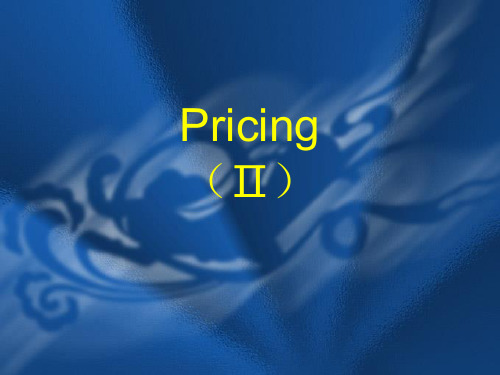
Paragraph 7 - 8
What are the two kinds of deceptive pricing? ➢ Misinterpreted credit terms 信用术语的曲解 ➢ Misinterpreted sale prices 销售价格的曲解 What content does the Consumer Credit
to gain certain amount of profit) ➢ To meet competition sacrifice: to dispose of (goods, property,
etc.) regardless of profit
Paragraph 11 - 13
What is “market share”?
Paragraph six
Why do manufacturers give retail prices for their goods? And why was this sort of behavior abolished later?
Resale price maintenance: is the effect of rules imposed by a manufacturer on wholesale or retail resellers of its own products, to prevent them from competing too fiercely on price and thus driving profits down from the reselling activity. The manufacturer may do this because it wishes to keep resellers profitable. Such contract provisions are usually legal under US law but have not always been allowed since they formally restrict free trade.
英语泛读教程3第一单元Unit-1的答案与难句PPT课件
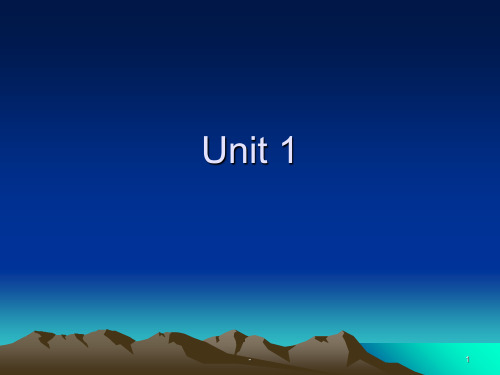
-
5
5. awe [ɔ:] n. 敬畏;畏怯 He gazed at her in awe. vt. 使敬畏;使畏怯 He refused to be awed by the threatening
7.b 8.a
9.a 10.d
3. 11. 12. b 13. b 14. d 15.c
4. Home reading:
5. d 2. a 3. c 4.d
6. 5. d
6. a
7.a 8.c
-
3
Important words and sentences:
1. emphasis['emfəsis] n.强调,重视,重点 [C][U][(+on/upon)]
creative thinking as in creativity in general. 6. Key: 和普通意义上的创造性一样,创造性思维
也遵循同样的原则。
-
8
4. conjure up 凭幻想做出 I can‘t simply conjure up the money out of thin air. 我是不能像变魔术似的把钱变来。 5. head for 6. pry into 窥探
letters.
6. contemplate [‘kɔntem,pleit] vt. 仔细考虑 e.g. He contemplated the problem before making a decision. 注视,凝视 e.g. She lay on the grass, contemplating the high, blue
大学英语泛读3unit1课后答案(1)
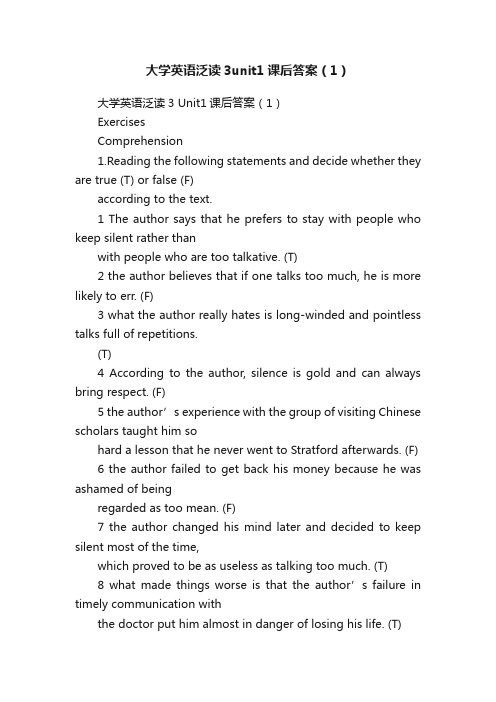
大学英语泛读3unit1课后答案(1)大学英语泛读3 Unit1课后答案(1)ExercisesComprehension1.Reading the following statements and decide whether they are true (T) or false (F)according to the text.1 The author says that he prefers to stay with people who keep silent rather thanwith people who are too talkative. (T)2 the author believes that if one talks too much, he is more likely to err. (F)3 what the author really hates is long-winded and pointless talks full of repetitions.(T)4 According to the author, silence is gold and can always bring respect. (F)5 the author’s experience with the group of visiting Chinese scholars taught him sohard a lesson that he never went to Stratford afterwards. (F)6 the author failed to get back his money because he was ashamed of beingregarded as too mean. (F)7 the author changed his mind later and decided to keep silent most of the time,which proved to be as useless as talking too much. (T)8 what made things worse is that the author’s failure in timely communication withthe doctor put him almost in danger of losing his life. (T)2.Choose the best answer to each of the following questions based on theinformation from the text.1 we learn from the text that the author doesn’t like people who talk too muchsimply because___C_.A he is too impatient personB he believes that silence is goldC he hates a long-winded speakerD he is too busy to mix with gasbags2 The author learned from his bitter experience as a guide for a group of visitingChinese scholars that __A__.A one has to make use of speech and silence alternatelyB silence may sometimes lead to misunderstandingC talking too much may land one in troubleD money is a serious master that allows no negligence3 By saying that trip to Stratford “was certainly the most miserable one”, the authormeans that __D_.A he didn’t gain anythingB he resented the head visitor for his abruptnessC he couldn’t satisfy the visitorsD he felt he was helplessly stupid4 The author liked the nurse better than the doctor in that _C__.A she took good care of himB she spoke less authoritativelyC she was more frank than the doctorD she saved him at the critical moment5 The author’s view on speech versus silence can be boiled down to the statementthat _A__.A speech is indispensable and silence is worthwhile sometimesB silence is important so that you won’t make others hate youC silence often results in one’s physical dangerD speech shows weakness while silence shows strength6 The author’s story was told in a _D__.A properB humorousC subtleD practical3.Translate the following sentences from the text into Chinese.1 Leaving aside such gasbags who are after all exceptions rather than the rule, westill have those people who j ust do not know when to “leave well alone” when they are speaking or explaining something.废话连篇的人毕竟是个例,不是惯例,我们姑且不谈他们。
英语泛读教程3上课文+译文(Unit1-7)
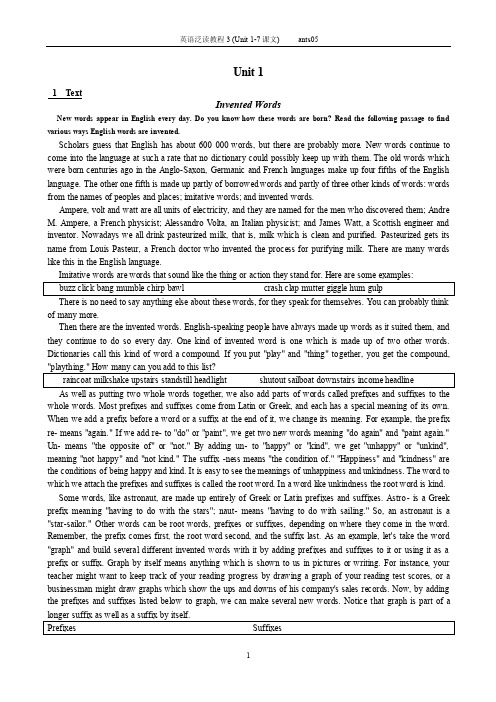
Unit 11 TextInvented WordsNew words appear in English every day. Do you know how these words are born? Read the following passage to find various ways English words are invented.Scholars guess that English has about 600 000 words, but there are probably more. New words continue to come into the language at such a rate that no dictionary could possibly keep up with them. The old words which were born centuries ago in the Anglo-Saxon, Germanic and French languages make up four fifths of the English language. The other one fifth is made up partly of borrowed words and partly of three other kinds of words: words from the names of peoples and places; imitative words; and invented words.Ampere, volt and watt are all units of electricity, and they are named for the men who discovered them; Andre M. Ampere, a French physicist; Alessandro Volta, an Italian physicist; and James Watt, a Scottish engineer and inventor. Nowadays we all drink pasteurized milk, that is, milk which is clean and purified. Pasteurized gets its name from Louis Pasteur, a French doctor who invented the process for purifying milk. There are many words like this in the English language.There is no need to say anything else about these words, for they speak for themselves. You can probably think of many more.Then there are the invented words. English-speaking people have always made up words as it suited them, and they continue to do so every day. One kind of invented word is one which is made up of two other words. Dictionaries call this kind of word a compound. If you put "play" and "thing" together, you get the compound,whole words. Most prefixes and suffixes come from Latin or Greek, and each has a special meaning of its own. When we add a prefix before a word or a suffix at the end of it, we change its meaning. For example, the prefix re- means "again." If we add re- to "do" or "paint", we get two new words meaning "do again" and "paint again." Un- means "the opposite of" or "not." By adding un- to "happy" or "kind", we get "unhappy" or "unkind", meaning "not happy" and "not kind." The suffix -ness means "the condition of." "Happiness" and "kindness" are the conditions of being happy and kind. It is easy to see the meanings of unhappiness and unkindness. The word to which we attach the prefixes and suffixes is called the root word. In a word like unkindness the root word is kind.Some words, like astronaut, are made up entirely of Greek or Latin prefixes and suffixes. Astro- is a Greek prefix meaning "having to do with the stars"; naut- means "having to do with sailing." So, an astronaut is a "star-sailor." Other words can be root words, prefixes or suffixes, depending on where they come in the word. Remember, the prefix comes first, the root word second, and the suffix last. As an example, let's take the word "graph" and build several different invented words with it by adding prefixes and suffixes to it or using it as a prefix or suffix. Graph by itself means anything which is shown to us in pictures or writing. For instance, your teacher might want to keep track of your reading progress by drawing a graph of your reading test scores, or a businessman might draw graphs which show the ups and downs of his company's sales records. Now, by adding the prefixes and suffixes listed below to graph, we can make several new words. Notice that graph is part of aYou may have noticed that you can make even other words using some of these prefixes and suffixes without graph. "Biology" is the study of life. What do you think is the meaning of "biologic"? If the prefix anti- means "against," what does "antibiotic" really mean? There are hundreds of Latin and Greek prefixes in the English language, and the possibilities for inventing new words are endless. Every day, as we make new discoveries in science and technology, we invent new words to describe them. Many of these new words are combinations of root words and prefixes and suffixes which have already existed in English for centuries.Another kind of invented word is the nonsense word. Some nonsense words are used for a while by only a few people and then disappear completely from the language, never to be used again. Others, when they become popular enough and are used over a period of time, become a permanent part of the language. If enough people decide and agree on the meaning of an invented word, it is here to stay. Some examples of everyday modern words which probably began as nonsense words centuries ago are: bad, big, lad, lass, chat, job and fun. Linguists guess that these are nonsense words because they have not been able to trace them back to any of the ancestor languages. Just who invented them, and when or where remains a puzzle. Puzzle itself is one of these mystery words. No one knows where it came from.Lewis Carroll, author of Alice in Wonderland and Through the Looking Glass, was a great inventor of nonsense words. As a matter of fact, he created a whole language of nonsense. Most of Carroll's nonsense words are not used in English, except for "chortle." Chortle, Carroll tells us, is a cross between a chuckle and a snort. The word is formed by packing two different meanings together in it. The dictionary calls such words blends. A fairly recent blend, which, unfortunately, we hear almost every day, is "smog," a combination of smoke and fog.People invent nonsense words by combining certain sounds that just seem to fit the things or actions they describe. Often we make up words for anything which is basically rather silly. Spoof was invented by an English comedian some fifty years ago. It means "to poke fun at." Hornswoggle was used a great deal in the United States during the nineteenth century, and it means "to cheat." If a dishonest politician wants to hornswoggle the taxpayers, he invents a "boondoggle," which is a useless, expensive project which does nobody any good. Fairly recently someone invented the word "gobbledygook." When people talk or write using long, fancy words that really mean nothing, we call it gobbledygook. Unfortunately, many people use gobbledygook because they want to seem more important than they are, or because they don't really want people to understand what they mean or what they are doing. So, when the dishonest politician wants to hornswoggle the public with a boondoggle, he usually explains things in gobbledygook.When Lewis Carroll was writing his books the word gobbledygook had not been invented yet, but Carroll would have known exactly what it meant. Carroll loved to spoof or poke fun at people who used fancy, important-sounding words when simple language would have done better. In one part of Through the Looking Glass, Alice has a conversation with Humpty Dumpty in which Humpty Dumpty insists words can mean whatever he wants them to mean. Alice insists that this is impossible. If everyone did that no one would understand anyone else. The conversation goes like this:"But 'glory' doesn't mean 'a nice knockdown argument'," Alice objected."When I use a word," Humpty Dumpty said, in rather a scornful tone, "it means just what I choose it to mean -neither more nor less.""The question is," said Alice, "whether you can make words mean so many different things.""The question is," said Humpty Dumpty, "which is to be the master -that's all."The question is, just as Humpty Dumpty said, which is to be master. But Humpty Dumpty used words in an odd way, and that made him a master of gobbledygook, not a master of language. A master of language knows what words really mean, and where they come from; knows when to use big, important ones and when to use the shorter, equally important simple ones. Winston Churchill was a great British prime minister. He was also a great writer, truly a master of language. He said once, "Short words are best, and old words when they are short, are best of all."(1545 words) 译文:新造词英语中每天都有新词出现。
新编剑桥商务英语(高级)第三版3.1

新编剑桥商务英语(⾼级)第三版3.1MODULE 3 BUSINESS TOPIC3.1 Communication at workVOCABULARY Mean of communication1What does this quotation mean to you?‘Think like a wise man but communication in the language of the people.’W.B. Yeats, poet (1865-1939)2 Delete the verb that does NOT go with each type of business communication.0 an email send /draft /post1 a phone call do/make /receive2 a press release put up /issue/put out3 an advertising campaign launch/run /make4 a presentation give /make/ tell5 a meeting or seminar hold /attend /carry out6 a report produce/run/publish7 a notice put out/put up/ display8 a memo to all concerned publish/send out/circulate9 information on the Internet post/make/put3 For which of the following would you feel most confident using your English? Andleast confident? Discuss with your partner.a presentation a meeting a phone call a report an email4 Discuss these quotations with your partner.●Have you had good experiences of dealing with companies through call centres?●Do you shop on the Internet? WHY? /WHYNOT?●With which products or services is face-to-face contact helpful? With which is itunnecessary?5 Read the five extracts from the magazine Management Now on page27 and thenmatch each of the eight statements (1-8) with one of the extracts. You will need to use some of the texts more than one.0 You can gather a lot of customer data with modern computer systems. A1 One future trend will be more direct contact between companies and their customers._____2Business hasn’t really changed, only the media of communication._____3Companies need to think about which channel is most appropriate to their customers ’needs._______4Customers are frequently frustrated by not being put though quickly to the person they need to speak to._____5There is less human interaction nowadays, but this isn’t necessarily bad for the customer.________ MANAGEMENT NOW. APRIL ISSUEBetter communication?‘THE MORE ELABORATE OUR MEANS of communication, the less we communication.ˊThese were the words of Joseph Priestly over 200 years ago .But if that was true then ,what would he make of communications technology today?Natalie Fitzgerald asked five people working in the field what they thought.A Bill Osmond, data analystI think he’s got a good point. Powerful IT systems give companies enormous amounts of information on customer behavior, but it’s what they can do this data that matters.A good example in recent years was Centrica, the British utility company. It acquired a big portfolio of different companies and then spent huge amounts of money on an IT system designed to cross-sell its various products and services-financial services, telephone contracts, energy supply and so on _to the customers in its different businesses. But they never managed to do it, because their IT people were unable to merge all the customer databases or to make them talk to each otherB SARAH BRIDGESTONE, former call centre managerAbsolutely. Call centres can more often act as a barrier than a help. Talk the example of a well-known mobile phone operator. When a customer calls, he’s given a list of optionsto choose from: dial I for bill enquiries, 2 to upgrade his handset, 3 if he has a technical problem, 4 if he’s thinking of leaving the company. From each of these he’s taken through another list of options. If he still can’t find what he is looking for, he’s invited to ‘stay on the line until an operator becomes available’. This can take up to ten minutes, by which time he is now seriously thinking of going back to option 4 and cancelling his contract. It really seems counter-productive.C DOUG COOK, bank managerThere is no doubt that modern communication channels have depersonalized a lot of customer contact. Banks have been doing this for years, trying to commoditise the service that they offer so that they can rationalize it and make it cheaper to deliver Most transactions- bank deposits, cash withdrawals, issuing of statements-have been automated whether at a cash machine, over the phone or online. This has saved companies and the customer money. But cost-cutting is by no means the only driver- it’s a trend also driver by c ustomer demand for a quick and flexible service.D FARHANA PATEL, online retailerIt’s just about convenience. Whether I text you a message or tell you the same message face-to-face, it’s still a message. The growth of Internet shopping compared to that of high street shopping shows very clearly that customers want cheaper and more accessible services. Sellers like the convenience too of course. eBay started out as a market place for individuals but, increasingly, companies have used it to sell products direct to consumers. In face it’s not very different from a traditional market place. There is still a community of buyers and sellers who talk to each other and do business just the same as if they were dealing face-to-face.E BRIAN MACWHINNEY, management consultantBusinesses are often too quick to embrace new technology in order to save money or gain a competitive advantage. But applying the same solution to all types of business is never a good idea. There are cultural factors to consider. Using a call centre in India to handle enquiries about train times on railways in Europe is a bad idea because it isn’t suited to customers’expectations. On the other hand, a European customer of a computer company doesn’t really mind if his technical problem is solved by a call centre operator in India or Ireland or Alaska, because it doesn’t require any cultural knowledge. Good communication is about finding the right channel. In time, I expect we’ll see a return to more face-to-face contact with customers and more local services. SPEAKING 1 Which of the following do you find useful? When do you use it? Why? mobile phone email SMS MSN Blackberry2 Decide the best ways to communication the following messages.letter has been written for you).0 To answer somebody, you give a reply.1 To ask for something, you make a r_____.2 To help someone remember, you give them a r_____.3 To suggest or recommend something, you make a p_____.4 To say something publicly, you make an a______.5 To say sorry you make an a______.6 To insist that someone does something, you make a d_____.GRAMMARGrammar TipOften verbs that express a similar notion will take the same form, eg dissuade discourage, deter are all followed by someone from doing.This can also be the case with opposite notions, eg agree and refuse +to do.I discouraged him from applying for the job.I dissuaded him from applying for the job.Verb patternsIn the email below, all the forms following the communication verbs (discuss, apologise etc) are underlined. Some are incorrect. Correct them.Dear Jimfor givingfor givingFirst of all, I would like to thank you (0) about giving up your time to help us.It’s very kind of you to agree (1) working with us on this project-I know you are very busy.When we last met, we discussed (2) about creating a special team to deal with complaints from customers. I have since had a meeting with Sarah, the head of the Customer Services team, and I have persuaded her (3) to join us. She suggested (4) to meet next week to put a plan in place. In the meantime, she is going to encourage her team (5) for giving their ideas.I must just tell (6) to you something which happened last week that shows how much we need a better system for dealing with complaints.Last week, a customer rang to complain (7) about having to wait one month for delivery of a DVD player. He accused us (8) to keep his money so that we could earn interest on it before delivering the product. The sales person who answered the call offered (9)giving him a discount, without even checking the history of the order. When I checked, I discovered an email from us in forming the customer when he thought the product (10) that there will be a one-month delay in delivery. The salesman was very defensive and said that he couldn’t be criticized (11) of trying to keep the customer happy!So you see, we’ve got a lot of work to do. Looking forwa rd to hearing from you. Best wishesKarenPS Remind me (12) to pay for lunch next time!5 Put the words below into their correct place in the table.urge threaten propose undertake praise blame recommend deny convince6 Complete these sentences.0 They threaten to take us to court if we didn’t pay them immediately.1 It’s a very sensitive issue. I suggest __________ an anonymous email.2 Once, in a restaurant, I complained ___________ and the manager told us to leave.3 What a waste of time! We spent three hours discussing___________.4 The company offered__________, but amazingly she refused.5 I’ve promised ___________ by tomorrow morning.6 I can’t believe you had to remind him ____________. That’s his job.7 The regulator accused the company ______________ in its advertisements.GRAMMER 1 Talk about one of the situations 1-4, answering the following questions. Remember to use the correct verb patterns.●When did it take place?●What happened?●Who was there?●What was sai d1 an unusual presentation or talk that you attended2 a memorable job interview you had3 a meeting where two people disagreed strongly4 an interesting business proposition that was made to youWhen I was in my final year of university, a friend asked me if I wanted to join him in a new business venture. Before I could agree to do it, I had to be sure that it was…LISTENIING Dealing with problems2 Look at this customer charter published on the website of Penco Telecommunications. How is it intended to make you feel about the company?Do you believe their promises?Penco Telecommunications… service is our passionCustomer charterOur promise. We will:respect your privacy and keep your detail confidential.offer you the best rates for national and local calls: if you find better, we’ll refund the difference.answer your calls to our customer service centre within three rings.be punctual for service visit appointments(never more than one hour late).give you impartial advice on the best telephone and technology package for you. answer any email within four hours and any letter within five days.carry out satisfaction surveys each three months to ensure you are happy with our service.3 3.1 Listen to this phone conversation between an angry customer and a call centre operator for Penco Telecommunications.1What is the customer’s problem?2What solution s does the operator suggest?3Which one does the customer accept?4 3.1 Listen again and complete the phrases that the operator uses to deal sensitively and efficiently with the problem. Use 1-3 words for each space.1 I ____________ the wait, sir.2 Can I have your number and I__________ it straightaway?3 Don’t worry, I’ll________ to you.4 He can be there by 6 pm._______________ convenient?5 I __________ understand. In ____________, I’m going to have to reschedule him for another day.6 I ____________ what I can do. Please just___________ for a moment.7 Would that be___________________?8 If you ____________ tell me your mobile number, I can get that activated immediately. SPEAKING Handling calls sensitively5 Work with a partner. Take it in turns to make the call or receive the call. Study each situation and then act out the telephone conversation. Deal sensitively with each problem. Look at the notes below and prepare your telephone calls.Student A1 You work for a parcel delivery company. Your computers have been behaving strangely today. Receive the call from a customer.2 You ordered a fish tank from a mail order company. The picture in the catalogue showed a complete fish tank with heater, air pump and fish. But when it arrived it was just a glass box. Telephone to complain.3 It is 6:30 in the morni ng. You receive a call from someone that you don’t know. You don’t like receiving unsolicited calls at home.4You work in the service department of an electricity company. You receive a request which is not really possible to satisfy. Students B1 You have ordered delivery of a new laptop computer. When you track the order on the internet, you find that it has gone from Ireland to HongKong. You live in London. Telephone to find out what’s happening.2 You work for a mail order company that supplies aquariums and accessories. You receive a call from an unhappy and confused customer.3 You work for a promotions company for a fitness club. You call potential customers in the evenings to offer them a free month’s trial of their local gym. Make the call.4 While at work you suddenly realise that you have left your iron on at home –in a small village one hour’s drive away. Telephone the electricity company to see if they can cut of the electricity supply to your house.。
新编商务英语泛读book 3 unit 1 A
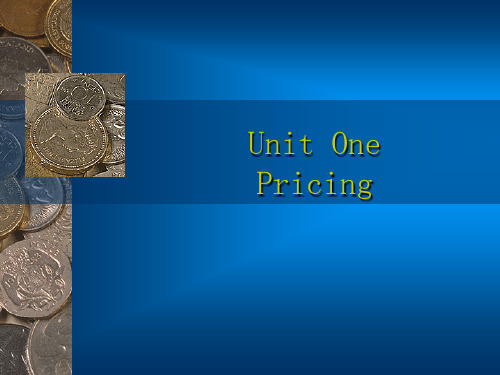
• When strong distaste for a style has set in and it can no longer be sold at any price, the fashion is in its obsolescence stage.
• Besides price-changing, are there any other factor (s) influencing the revenue?
• (customers; competition; general economic conditions; etc.)
• What does a marketer do to ensure an effective price of his product?
Paragraph 9 - 11
• What aspects do the costs and expenses of a product include? (production costs & operating costs) ➢expenditure in making the product ➢employees’ wages ➢shipping charges (运输费用) ➢advertising & selling costs ➢business taxes ➢costs of major accessory equipment & operating supplies ➢research & development costs
泛读教程第三册unit1~18答案全
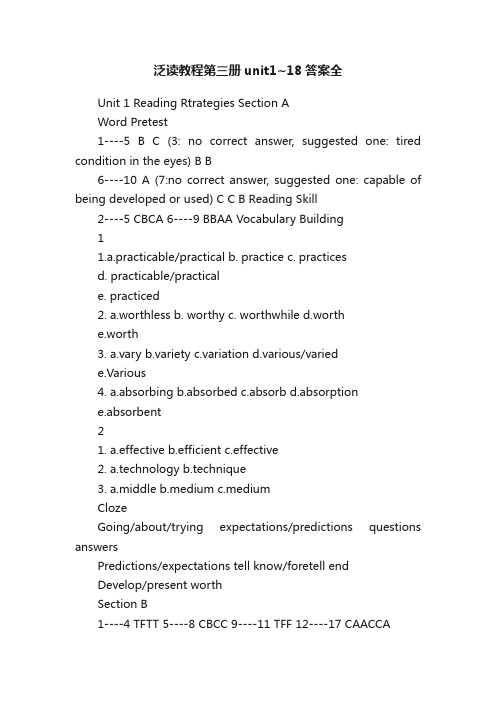
泛读教程第三册unit1~18答案全Unit 1 Reading Rtrategies Section AWord Pretest1----5 B C (3: no correct answer, suggested one: tired condition in the eyes) B B6----10 A (7:no correct answer, suggested one: capable of being developed or used) C C B Reading Skill2----5 CBCA 6----9 BBAA Vocabulary Building11.a.practicable/practical b. practice c. practicesd. practicable/practicale. practiced2. a.worthless b. worthy c. worthwhile d.worthe.worth3. a.vary b.variety c.variation d.various/variede.Various4. a.absorbing b.absorbed c.absorb d.absorptione.absorbent21. a.effective b.efficient c.effective2. a.technology b.technique3. a.middle b.medium c.mediumClozeGoing/about/trying expectations/predictions questions answersPredictions/expectations tell know/foretell endDevelop/present worthSection B1----4 TFTT 5----8 CBCC 9----11 TFF 12----17 CAACCASection C1----4 FFTF 5----8 FTTTUnit 2 EducationSection AWord Pretest1----5 ABACC 6----11 ABABCCReading Skill4----6 CBB1----6 FTFFTTVocabulary Building11. mess2. preference3. aimlessly4. remarkable/marked5.decisive6.shipment7. fiery8.physically9.action 10.housing2 1. a.aptitude b.attitude2. a.account b.counted c. counted3. a.talent b.intelligenceClozeOther just/only has some/many than refuse see/know/understand that without If ready/willing/educated/taughtwrong/incorrect/erroneousSection B1----5 ACCCC 6----10 CCCAC11----14 BABASection C1----6 CCDDACUnit 3 Body LanguageSection AWord Pretest1----5 ABCCB 6----9 DCDCReading Skill2----5 BABC 6----10 AACBCVocabulary Building1admission admit admissible admissibly reliance rely reliable reliablydefinition define definite definitely assumption assume assumed/assuming assumedly/assuminglybehavior behave behavioral behaviorally variety vary various/varied variously/variedly part/partiality part partial partially manager manage managerial managerially correlation correlate correlative correlativelyadaptation/adaption adapt adaptive adaptively 21.a. inspired b. aspired c. inspired2.a. token b. badges c. token3.a. contemporaries b.temporary c. contemporaryClozecommunicate ways/means/ones using/saying in ofmessage meet/have/encounter/experience causes meaning to eyesSection B1----6 BABBAC 7----12 FFTTTF 13---15 CCB Section C1----4 BBDD 5----8 BCCA1----6 FFTFFTUnit 4 AnimalsSection AWord Pretest1----5 CACAA 6----10 BBBCCReading Skill2----5 BBAC 6----10 BCCAAVocabulary Building11. moist2. betrayal3. exclusively4. inhumane5. amazed/amazing6. endangered7. marvels8. deadly21.a. dessert b. deserted2.a. favourite b. favourable c. favourable3.a. awarded b.reward c. awardedClozeparents idea at/by seen landmarks instance/example migrate guide/direct pole effect/influence It/This if/whether experiments Section B1----3 CCB 4----6 FTF 7----10 BCAC 11----15 CBACCSection C1----5 FFTFF 6----10 FTTFTUnit 5 HistorySection AWord Pretest1----5 CAABC 6----9 ACCCReading Skill2----6 CABCB1----6 FFTFTTVocabulary Building1assumption assume assumed/assuming assumedly/assuminglyacknowledgement acknowledge acknowledged acknowledgedlyreflection reflect reflective reflectively domination dominate dominant dominantly category categorize categorical categorically implication imply implicative implicatively reassurance reassure reassuring reassuringly definition define definite definitely21.a. Historical b. historic2.a. rejected b. resist3.a. test/analyze b. analyzedClozeexisted/appeared over head/brain body found language use/value/significance/importance single passed ahead survival/existence handling/overcoming Section B1----6 CABCBB 7----12TTTFTT 13----15 CAC Section C1----4 BBAA 5----8 ACBCUnit 6 LanguageSection AWord Pretest1-----5 CACBA 6----10 BACAB 11----12 AB Reading Skill3----6 CAAC 7----10 ACCAVocabulary Building1availability avail available availably conquest conquer conquering/conquered conqueringlyluxury luxuriate luxurious luxuriouslyorigin originate original originally occurrence occur occurrent 无副词形式system systematize systematical/systematic systematicallyphonology 无动词形式phonological phonologicallydecision decide decided/decisive decidedly/decisivelyvariety vary various variouslysuperiority 无动词形式superior superiorly21.a. peculiar b. particular c. particular2.a. assess b. access c. access3.a. resources b. sources c. sourcesClozesex Men differs compliment/words complimentingcauses makes languages have outside understood have use circle/world/field Section B1----5 CBBBA 6----10 CBCCB 11----15 CBACC 16----17 BA Section C1----5 BBCAB 6----10 BACCBUnit 7 SpaceSection AWord Pretest1----4 ABAB 5----8 CBACReading Skill1----4 BBBC 5----8 CBCBVocabulary Building11. deduced2. behaviour3. adhere4.replacement5. option6.delicacy7. enormous8. pursuit21.a. inquired b. required c. inquire d.required2.a. compatible b. comparable c. compatible d. comparable Clozesatellite some space asked/wondered life sort/kind orbiting/going/circling have living were believe ownsolar where likely living throughSection B1----5 FTFFT 6----10 TTTTF 11----12 FF13----18 BBCACCSection C1----5 BCBCC 6----8 AED1----6 EBAFDCUnit 8 WomenSection AWord Pretest1----5 BCABC 6----10 BBCCAReading Skill1----5 CBABC 6----10 BCCCCVocabulary Building1occupation occupy occupational occupationally segregation segregate segregated discrimination discriminate discriminating/discriminatorydiscriminatingly/discriminatorilyenforcement enforce enforceable enforceably exclusion exclude exclusive exclusively perseverance persevere persevering perseveringlyconviction convict convictive convictively amendment amend amendablesuperficiality superficialize superficial superficiallyspectator spectate spectatorial21.a. job b. career c. jobs d. career2.a. principal b. principles c. principal d. principle3.a. feminine b. female c. feminineClozeacceptable domestic property wages husband divorce claims legal suit permitted make excluded lacked belonged determined Section B1----5 BACCC 6----10 CACCC 11----16 AABBAC 17----19 TTF Section C1----6 CCAACBUnit 9 CitiesSection AWord Pretest1----5 BAABC 6----10ACBBA 11----12 BC Reading Skill1----5 CACCB 6----10 BBBBA 11----12 CB Vocabulary Building11.typifies2. dominant3. familial4.competitive 5. vibrate6. descended7. departure8.boom9. countless 10. symbolizes21.a. recreation b. recreates c. recreation2.a. rhythm b. rhyme c. rhymes d. rhythm ClozeSea within of divides built/constructed/completedCelebrated inside/in attract together when Section B1----5 FTFTT 6----10 CCBBC11----15 BAACC 16----17 ACSection C1----5 BAACA 6----10 BCCCCUnit10 Cross-Cultural CommunicationWord Pretest1----5 CABCB 6---10 BBBABReading Skill1---5 CBCAC 6---10 CCABBVocabulary Building1consequence consequent/consequential consequently/consequentiallysophistication sophisticate sophisticated sophisticatedlyreference refer referable referablyconversation converse conversational conversationallyspace space spatial/spacious spatially/spaciouslydetachment detach detachable/detached detachably/detachedlyintervention intervene interveningtype typify typical typically21.a.assure b.ensure c.assured d.ensure2.arises b.raised c.rise d.raisede.arisen3.clue b.cues c.clue d.cueClozewell separating/isolating is own close need look order respect followprior sign/cue help was/were else Section B1---5 BBCTT 6---10 FBCAC 11---15 ACTFFSection C1---5 TFFTF 6---8 FFFUnit 11 Information Retrieval Section AWord Pretest1---5 ACBCB 6---8 ABBReading Skill1---5 BCBAC 6---10 CCCCC Vocabulary Building1.information inform informative informatively specification specify specific specifically addition add additional/additive additionally/additivelyspecialty specialize special specially narration narrate narrative narratively extension extend extensive extensively origin originate original originally explosion explode explosive explosively ambiguity ambiguous ambiguously establishmentestablish established1.extension2. ambiguity3.original4.specified5. additional6.unambiguously7.explosion/doc/548496f9941ea76e58fa047b.ht ml rmation9.specialized 10.narrative 11.establishment2.1.a.transform b.transferred c.transferredd.transformed2.a.lonely b.alone c.lonely d.alone Clozelibrary amounted own burned/destroyed by counties’ send suggestion/proposal librarySection B1---5 ACBCB 6---10 ACCAC 11---17 ABABBABSection C1---5 BCACC 6---10 CBCCCUnit 12 EnvironmentSection AWord Pretest1---5 CCBBC 6---12 AACCCBAReading Skill1---5 CABBC 6---8 CBBVocabulary Building1.1.reaction2.mass3. polluting4.planetary5.suspicious6.alarming7.emitted8.emerged 2.1.a.warned b.threatened2.a.spread b.spread c.sprayed3.a.emergency b.emergenceClozesolve communities creative prevention disposal resources recycling waste increase place measures amountSection B1---5 FFTTB 6----10 CACFT11---15 FFABC 16---18 CBCSection C1---5 BCAAC 6---8 CBCUnit 13 MedicineSection AWord Pretest1---5 ABAAC 6---10ABCBAReading Skill1---6 CCBABB 1---5 FTFTTVocabulary Building1.symptom symptomize symptomatic symptomaticallylonging long longing longinglyaddition add additional/additive additionally/additivelymanifestation manifest manifest manifestly depressiondepress depressed/depressing depressedly/depressing invariability invariable invariablyseparation separate separate separately condemnation condemn condemnable condemnablyimagination imagine imaginary imaginarily affection affect affecting affectingly2.1.a.remedies b.recipe c.remedy d.recipe2.a.alternate b.altered c.alternate d.alter3.a.acknowledged b.knowledge c.acknowledged Clozestep acknowledge prevent essential physician due physical psychosomatic disease confidence symptoms thorough emotional upsettingSection B1---5 CBCAB 6---10 CBBCB 11---15 ABCAC Section C1---5 TFFFT 6----10 FTFFFUnit 14 EvolutionSection AWord pretest1---5 BCABA 6---8 CBAReading Skill1---4 CACC 1---4 TTFTVocabulary Building1.1.reluctant2.evolution3.attributed4.catastrophic5.associate6.indifferent7.emerged8.stir 2.1.a.evolved b.revolves c.evolved2.a.dismay b.dismal c.dismal d.dismay3.a.contribute b.attributed c.contributedd.attributedClozecharacteristic/trait/nature changed/had to longget/eat possessed/developed/had stretched/lengthened longerpassed After have theoryeffect/influence notion/idea changeSection B1---5 DABFT 6---10 FTFDA 11---17 DBACFTF Section C1---8 TFTFTFTFUnit 15 TransportationSection AWord Pretest1---5 BBADA 6---11 DBBDCCReading Skill1---5: A A C C C 6—10: B B A B BVocabulary Building1.prevention prevent preventive preventively federation federate federal federally inadequacy / inadequate inadequately deception deceive deceptive deceptively prosperity prosper prosperous prosperously life live live/living/alive /effect effect effective effectively evaluation evaluate evaluable/evaluative / resident reside residential residentially vision vision visional/visionary visionally/visionarily1. evaluation2. federal3.prospertiy4. residential5. effect6. are living7. deceptively8. preventive/effective2.1.a.simile b.,metaphor2. a.ultimate b.unanimous c.ultimated.unanimousClozetransportation distance/away ground Stem trains electric station/stop name train threetrains stairs/steps passengers/people Section B1---6 D C D C C C 7---12 C C A B C B Section C1--- 8 C C A C C C C CUnit 16 TimeSection AWord pretest1-8: C C B B B B B CReading skill1-6: B A C C B CVocabulary building1.1. identification2. arbitrary3. practical4. foundation5. logic6. dictatorial7.occurence8. revise 2.1. a. presentation b. representation c. presentationd. representation2. a. base b. base c. basis d. basisClozeclocks wall pendulum ground/floor wood makers names clocks/timepieces invented/created/madefake/false/imitatedSection B1.A2.A3.C4.F5.T6.F7.T8.T9.T 10.T 11.B 12.C 13.C 14.C 15.A 16.ASection C1-8: A B A D D D C AUnit 17 TelevisionSection AWord Pretest1---5 CCACA 6---10 BCCBCReading Skill1---3 CCC 1---7 TFTFFFTVocabulary Building1.contradiction contradict contradictory contradictorilycenter center central centrallyseduction seduce seductive seductively necessity necessitate necessary necessarily visibility visualize visible visibly mobilization mobilize mobilizable mobilizably function function functional functionally dominance dominate dominant dominantly selection select selective selectively vocality vocalize vocal vocally1.visibility2.necessities3.seductive4.mobilize5.central6.functioning7.vocal8.dominant9.contradictory 10.selected2.1.a.immersed b.emerged c.immersed d.emerged2.a.dormant b.dominant c.Dormant d.dominantClozenumber happening house said graduates viewing TV school cases children reaches/draws imitate watching practice face backSection B1---1 CBBCB 6---10 FFFTC 11---15 ACBBC Section C1---5 TTFTF 6---10 FFFTTUnit 18 Poetry Questions on “If”1---5 AAABCQuestions on “The Rose Family”1---3 ABBQuestion on “My Candle Burns at Both Its Ends”1—3 BBC Questions on “The Negro Speaks of Rivers”1---3 CBBQuestions on “I Wandered Lonely as a Cloud”1---5 ACCBC 6---7 BCQuestions on “Sonnet 29”1---5 ABBCBQuestions on “In School Days”1---4 ABBC。
英语泛读教程3第三版答案
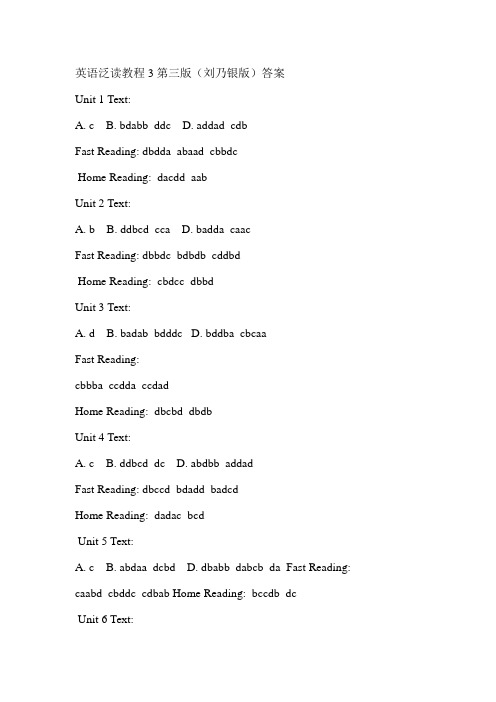
英语泛读教程3第三版(刘乃银版)答案Unit 1 Text:A. cB. bdabb ddc D. addad cdbFast Reading: dbdda abaad cbbdcHome Reading: dacdd aabUnit 2 Text:A. bB. ddbcd cca D. badda caacFast Reading: dbbdc bdbdb cddbdHome Reading: cbdcc dbbdUnit 3 Text:A. dB. badab bdddc D. bddba cbcaaFast Reading:cbbba ccdda ccdadHome Reading: dbcbd dbdbUnit 4 Text:A. cB. ddbcd dc D. abdbb addadFast Reading: dbccd bdadd badcdHome Reading: dadac bcdUnit 5 Text:A. cB. abdaa dcbd D. dbabb dabcb da Fast Reading: caabd cbddc cdbab Home Reading: bccdb dcUnit 6 Text:A. bB. cbcab ddad D. badaa cbaacFast Reading: cabcd aadcb ccdabHome Reading: ccdcd abcUnit 7Text:A. dB. acbda dcaac D. abaac daccd adFast Reading:daada cddbc bdcdb Home Reading: cbadb cddbcUnit 8 Text:A. cB. cddcc dccb D. abdac aaaFast Reading:ccacd bbdad babddHome Reading: dbdbc cbcdUnit 9 Text:A. cB. bccbc dbba D. dcbab dacba c Fast Reading:dcbca bccbc bcddd Home Reading: dcdca bdUnit 10 Text:A. cB. cdccd bacac D. dcdbc acadc bd Fast Reading:dbdcc dccdb bddca Home Reading: cadcb acbbUnit 11 Text:A. dB. adacc dcb D. abacb dcaab adc Fast Reading: dcdab ccbda ccbca Home Reading: bcadb bcdddUnit 12 Text:A. bB. bbbdd ccc D. cdccd acdba dca Fast Reading:bbddc dbdbc cdcdd Home Reading: bcdcc badbb c Unit13 Text:A. cB. cdcad bab D. cbada cabdbFast Reading:cdacc caccd bdbdb Home Reading: bdbcc bdd Unit 14 Text:A. cB. ddcad dab D. dacad babad bFast Reading:ddabb bddca dcccb Home Reading: cdcda ddUnit 15 Text:A. cB. abbac bccdb b D. babcc aaacd bb Fast Reading: caccb accd c ddada Home Reading: cdacd ddc。
- 1、下载文档前请自行甄别文档内容的完整性,平台不提供额外的编辑、内容补充、找答案等附加服务。
- 2、"仅部分预览"的文档,不可在线预览部分如存在完整性等问题,可反馈申请退款(可完整预览的文档不适用该条件!)。
- 3、如文档侵犯您的权益,请联系客服反馈,我们会尽快为您处理(人工客服工作时间:9:00-18:30)。
The Sherman Antitrust Act of 1890
The Clayton Act of 1914 The Robinson-Patman Act of 1936
Paragraph 3 - 8
What pricing activities should the government
What is monopoly, according to our
passage? What are the main contents of the laws mentioned in our passage?
Monopoly
In theory, an industry where one firm produces the entire
great profit? What are the goals of pricing mentioned in this part? To obtain a specific market share To achieve a specific return from sales (or: to gain certain amount of profit) To meet competition sacrifice: to dispose of (goods, property, etc.) regardless of profit
keep an eye on? Pricing fixing (maybe there is a minor spelling mistake in our books: pricing mixing) 定价 Price discrimination 价格歧视 Resale price maintenance resale price maintenance (美国厂商之间关于)不得低价转售商品的规定 Deceptive pricing be concerned with: be involved in; intervene in sth. c.f.: be concerned about: be worried about; pay attention to sth.
Withhold -- Misinterpret---v.误解,曲解 Misinterpretation---n, 误解
Tactics
Standing
Group discussion
We know that in planned economy, the
Байду номын сангаас
government intervened a lot in the economy; while at present, do you think it is still necessary for the government to regulate prices in a market economy? Please give your reasons. What practices are illegal in the matter of pricing? What goals should one have in mind when setting the price of a product?
Paragraph six
Why do manufacturers give retail prices for their goods?
And why was this sort of behavior abolished later? Resale price maintenance: is the effect of rules imposed by a manufacturer on wholesale or retail resellers of its own products, to prevent them from competing too fiercely on price and thus driving profits down from the reselling activity. The manufacturer may do this because it wishes to keep resellers profitable. Such contract provisions are usually legal under US law but have not always been allowed since they formally restrict free trade. profit margin: a ratio of profitability calculated as earnings divided by revenues. It measures how much out of every dollar of sales a retail business actually keeps in earnings. 剩余价值量或利润量同预付总资本的比率。它表示的是资本 增值的程度。 利润率 repeal: to revoke or withdraw formally or officially 撤销废除 withhold: to hold back; refrain 保留;抑止
Protection Act cover? What behavior should be punished by law concerning the sale? To have a sale based on an artificial price
The Consumer Credit Protection Act of 1968-
Paragraph 11 - 13
What is “market share”? the specific percentage of total industry
sales of a particular product achieved by a single company in a given period of time 市 场份额 What is “market position”? 市场地位 What should a company do to maintain its market position? succeeding: subsequent 随后的
Structure
Pricing
Pricing activities (4)
Goals of pricing (3)
Reading comprehension
Paragraph two:
What is the central idea of the federal laws? (to prevent unfair competition and monopoly)
which launched Truth in Lending disclosures-was landmark legislation. For the first time, creditors had to state the cost of borrowing in a common language so that you--the consumer--could figure out what the charges are, compare costs, and shop for the best credit deal. authentic: not false or copied; genuine; real erode: to eat into or away; destroy by slow consumption or disintegration 侵蚀
Paragraph four
What act can be regarded as “pricing fixing”? What are the behaviors of pricing fixing? It is an agreement between business competitors
The major forms of Monopoly Trust (托拉斯;垄断的最高形式)
Cartel (卡特尔)
Syndicate (辛迪加) Konzern (康采恩) Chinese Antimonopoly Law
(adopted at the 29th session of the Tenth National People's Congress on August 30, 2007)
Paragraph 7 - 8
What are the two kinds of deceptive pricing?
Misinterpreted credit terms 信用术语的曲解
Misinterpreted sale prices 销售价格的曲解
What content does the Consumer Credit
output of a market. In practice, in the UK any one firm that has 25% of a market is considered to have monopoly control.
原指站在市集的高地上操纵贸易,后来泛指把持和独占。
在资本主义经济里,垄断指在生产集中和资本集中高度发展 的基础上,1个大企业或少数几个大企业对相应部门产品生 产和销售的独占或联合控制。 垄断(或者称卖者垄断),一般指唯一的卖者在一个或多个 市场,通过一个或多个阶段,面对竞争性的消费者---与买者 垄断 (Monopsony) 刚刚相反。垄断者在市场上,能够随意 调节价格与产量(不能同时调节)。
